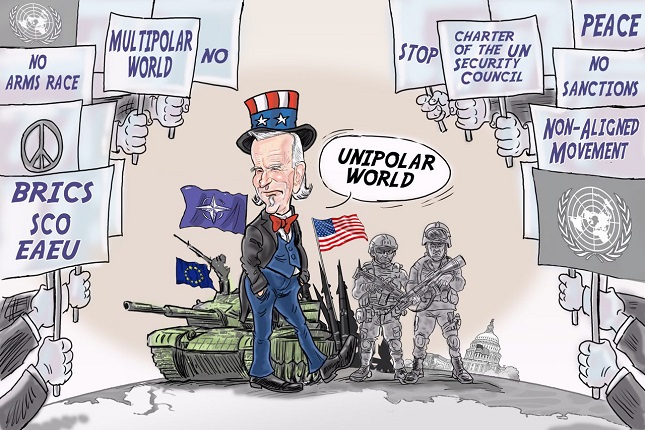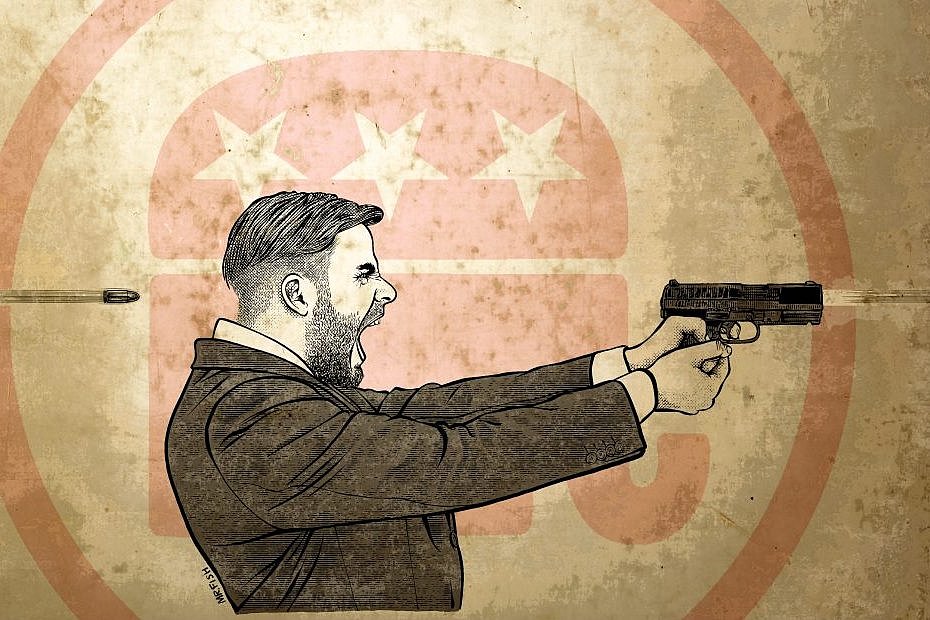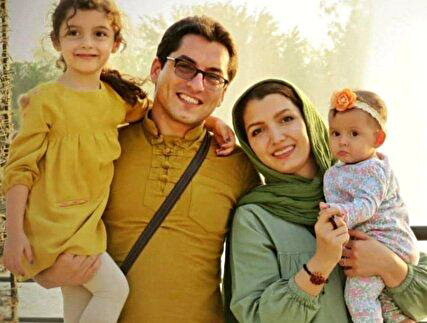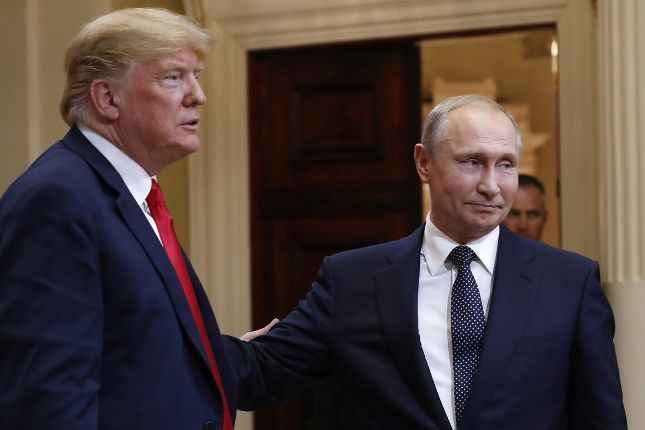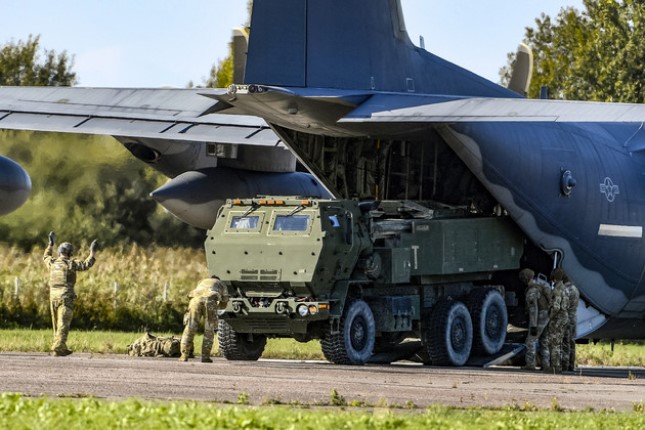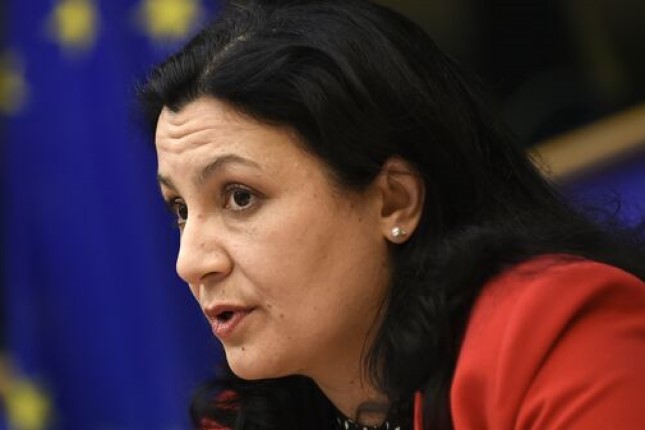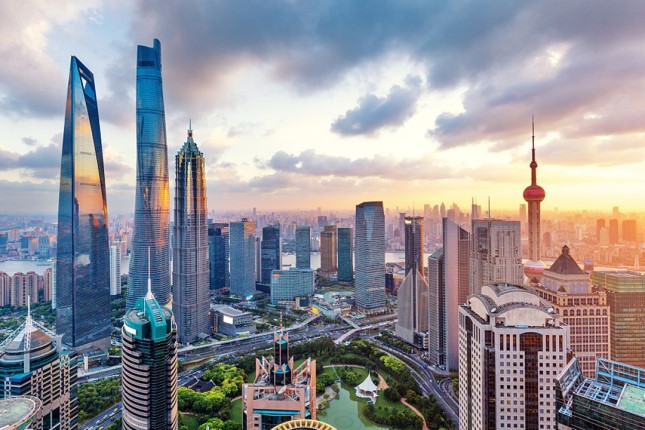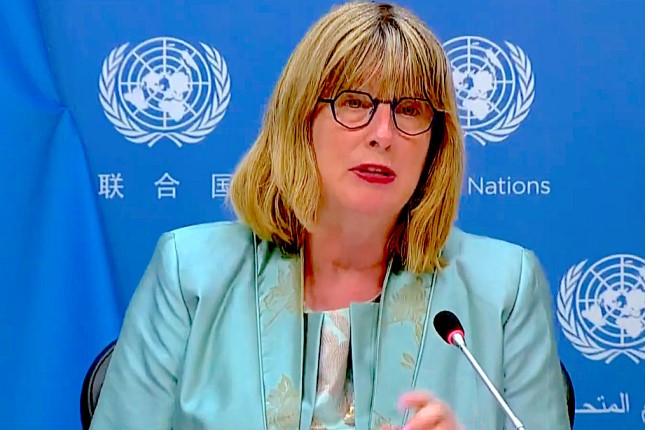It is impossible to imagine what the world will be like tomorrow if you don’t understand what it was like yesterday and what it really looks like today. Our concepts of a bipolar world having dissolved and a unipolar world taking over present a serious problem.
There was never a bipolar world led by the two opposing powers, USSR and US. This concept was a pure hoax that indulges egos in Washington, DC and Moscow. But what was the reality?
Institutionally, the UN Charter included primary provisions for a multipolar world, embodied in the principles of non-interference and equal sovereignty of nations. Five powers became permanent members of the UN Security Council, assuming a special kind of responsibility for peace and security, thus ensuring oligopoly in crisis management. Ten non-permanent members represented every region, making sure no decision could be taken without their support.
The nuclear arms race resulted in the US, Russia, UK, France, and China making up a "nuclear club" whose members privileged position and monopoly on nuclear weapons were subsequently sanctified by non-proliferation treaties.
Decolonisation turned Asian, African, and Latin American states, now formally free, into the most populous group of the world's nations. Some teamed up to create the Non-Aligned Movement, considerably influencing world politics and economy; its members could put the US and Israel under quite some pressure when it came to voting in the UN.
All of the above was, and for the most part, still an essential component of a multipolar world, but persistent belief in bipolar geopolitics resulted in a blurred vision. Thus, when the socialist camp was dissolved and the Soviet Union collapsed, everyone believed that the world was now unipolar.
This was highly beneficial to the US, enabling it to seemingly legitimately declare every dissident a "revenge-seeking murderer" of freedom and democracy, throwing around accusations of attempted subversion of the existing world order. In the early 1990s, the US and EU, positive that every international organisation naturally serves their purposes, forgot to try to reform them and, paradoxically, left their wired-in multipolarity intact. They were late to realise the need to deprive the UN of its legitimacy as, by that time, China, India, and many other nations had already risen to prominence at a global level. When Russia announced that a transition to a multipolar world was now its core goal in foreign policy, it unintentionally imbued the American myth of a unipolar world with false veracity.
Our world is made up of great civilisations and world religions fostered by humanity's history, stretching over millennia. Trying to arrange them hierarchically would be a crime against the world and humanity.
Therefore, the EU’s and US-led NATO’s claims to a special status and privileges such as a messianic role in world politics and economy, let alone their enforcement by violence, sanctions, and hybrid proxy wars, are in direct contradiction with the imperatives of inter-civilisational accord and trans-civilisational wisdom. The so-called collective West's actions and assertions of their legitimacy amount to the instigation of the very war of civilisations that Samuel Huntington has warned against.
It is thus evident that neither Russia’s special operation in Ukraine nor the West's response in the form of a total hybrid proxy war is about Ukraine. It also explains why most nations are unwilling to join the sanctions. Another reason why the pressure on Moscow and the non-agreeing players is so hard is that the fourth technological revolution's consequences have given rise to the considerable transformation of the whole world and the fundamental basics of interactions in the spheres of politics, economy, and technology. Integration may have become even more needed than before. Still, its imperatives are now different, progressing from rigid forms of cooperation based on politics, ideas, and values to flexible alliances ensuring reciprocal progress in critical spheres; from global value-creating chains to chains confined to a regional or transregional level; from alliances of nations to alliances of societies and a focus on human capital.
The EU, having served as the showcase example of the West's attractivity in the past decades, is now very slow to adapt because it is institutionally designed to be that way. Realising that rules will change one way or another, the Western world is hard pressed to impose more pressure on its rivals and its people. However, calling that agony would be premature. A lot depends now on whether Russia and a frustrated non-Western world can proceed from simply stating their dissent to cooperating in designing the outlines of desired future.
Instruments fit for designing and developing them in equal partnership, including Russia, are aplenty: there are BRICS, SCO, and a much-promising Eurasian Economic Union. Let us consider what these can do.
Some BRICS members are already considering adding one Asian, one African, one Latin American, and one European country. Supplementing a BRICS session with all the countries from the region of the currently presiding nation has proved to be an excellent idea. Summarily, BRICS should:
- create a universal payment system that would use no dollars or euros; make a shared cryptocurrency and digital money;
- create a network of foundations, financial organisations, and financial technology entities to attract investment for joint projects and start-ups;
- create a network of industry-specific, ministry-level permanent committees headed by currently presiding BRICS countries;
- establish a shared legislative community authorised to create shared-space legislation in spheres crucial for socio-economic progress, science, and technology, as well as creating, introducing, and routinisation of high technology;
- create a system able to oversee the implementation of joint decisions.
SCO could become a platform for forming a Comprehensive Greater Eurasian Partnership, as announced by Russian leaders at the 2016 St Petersburg Economic Forum. The most promising transport routes lie across the SCO countries, and every country using these routes will benefit from their increased security, making SCO a much-needed institution.
This partnership will be incomplete without a shared space in such spheres as education, research, and culture. The need for such is obvious as R&D work in fast-growing countries relies on access to technology to a no lesser degree than on national funding. All universal conventions of intellectual property rights were used to legalise Western companies' monopoly on the market of modern technologies, and national autonomy in technology cannot be technically attained by any of the emerging nations. This makes for the necessity of interdisciplinary cooperation in science and joint actions aimed at creating new-generation legislation tailored to help spread modern technology and ensure access to its adoption and use. As one of the first steps, open codes should be protected from hackers' attacks, for NATO's improper behaviour in the sphere of programming has already destroyed mutual trust.
Finally, the existing challenges make up for an excellent opportunity for the Eurasian Economic Union to introduce a new variety of agreements in foreign trade tailored not only to simplify regulations in traditional spheres of trade but also to exchange information and technology in critical spheres.
All these steps can be made if universal conventions or national legislation were adopted forbidding economic coercion and unilateral sanctions. Experts in Serbia are already widely discussing the need to ban unilateral sanctions constitutionally as the country remains the only one in Europe unwilling to integrate with Euroatlantic imperatives. Thus, the multipolar world order will breathe freely again, not broken by Euroatlantic narratives and centred on the UN leadership.
